- C Programming Tutorial
- C Programming useful Resources
The coulomb (symbol: C) is the International System of Units (SI) unit of electric charge.Under the 2019 redefinition of the SI base units, which took effect on 20 May 2019, the coulomb is exactly 1/(1.602 176 634 × 10 −19) (which is approximately 6.241 509 0744 × 10 18, or 1.036 × 10 −5 mol) elementary charges. The following table lists the Bitwise operators supported by C. Assume variable 'A' holds 60 and variable 'B' holds 13, then − & Binary AND Operator copies a bit to the result if it exists in both operands. (A & B) = 12, i.e., 0000 1100 Binary OR Operator copies a bit if it exists in either.
- C-SPAN.org gives you access to C-SPAN's daily coverage of Washington and more than 200,000 hours of extensively indexed and archived C-SPAN video.
- Data types in c refer to an extensive system used for declaring variables or functions of different types. The type of a variable determines how much space it occupies in storage and how the bit pattern stored is interpreted. They are again arithmetic types and they are used to define variables that.
- Selected Reading
If you want to set up your environment for C programming language, you need the following two software tools available on your computer, (a) Text Editor and (b) The C Compiler.
Text Editor
This will be used to type your program. Examples of few a editors include Windows Notepad, OS Edit command, Brief, Epsilon, EMACS, and vim or vi.

The name and version of text editors can vary on different operating systems. For example, Notepad will be used on Windows, and vim or vi can be used on windows as well as on Linux or UNIX.
The files you create with your editor are called the source files and they contain the program source codes. The source files for C programs are typically named with the extension '.c'.
Before starting your programming, make sure you have one text editor in place and you have enough experience to write a computer program, save it in a file, compile it and finally execute it.

The C Compiler
The source code written in source file is the human readable source for your program. It needs to be 'compiled', into machine language so that your CPU can actually execute the program as per the instructions given.
The compiler compiles the source codes into final executable programs. The most frequently used and free available compiler is the GNU C/C++ compiler, otherwise you can have compilers either from HP or Solaris if you have the respective operating systems.
The following section explains how to install GNU C/C++ compiler on various OS. We keep mentioning C/C++ together because GNU gcc compiler works for both C and C++ programming languages.
Installation on UNIX/Linux
Total video audio converter serial. If you are using Linux or UNIX, then check whether GCC is installed on your system by entering the following command from the command line −
C'est La Vie

If you have GNU compiler installed on your machine, then it should print a message as follows −
If GCC is not installed, then you will have to install it yourself using the detailed instructions available at https://gcc.gnu.org/install/
This tutorial has been written based on Linux and all the given examples have been compiled on the Cent OS flavor of the Linux system.
Installation on Mac OS
If you use Mac OS X, the easiest way to obtain GCC is to download the Xcode development environment from Apple's web site and follow the simple installation instructions. Once you have Xcode setup, you will be able to use GNU compiler for C/C++.
Xcode is currently available at developer.apple.com/technologies/tools/.
Installation on Windows
To install GCC on Windows, you need to install MinGW. To install MinGW, go to the MinGW homepage, www.mingw.org, and follow the link to the MinGW download page. Download the latest version of the MinGW installation program, which should be named MinGW-<version>.exe.
C Compiler
While installing Min GW, at a minimum, you must install gcc-core, gcc-g++, binutils, and the MinGW runtime, but you may wish to install more.
C&a Online Shop
Add the bin subdirectory of your MinGW installation to your PATH environment variable, so that you can specify these tools on the command line by their simple names.
After the installation is complete, you will be able to run gcc, g++, ar, ranlib, dlltool, and several other GNU tools from the Windows command line.
